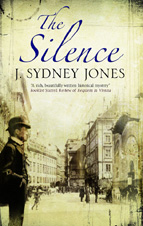 |
 |
 |
 |
 |
The Keeper of Hands
Vienna, 1901. With the police seemingly indifferent to the murder of a 19-year-old prostitute known as Mitzi, brothel-keeper Frau Mutzenbacher turns to lawyer Karl Werthen to find out what happened and bring her killer to justice. Yet the more he discovers about the mysterious Mitzi, with her secret past and impressive roster of clients, the more questions Werthen's investigation throws up. At the same time, Werthen undertakes a second commission: to find out who viciously assaulted playwright Arthur Schnitzler. Schnitzler believes his latest controversial play might have been the motive for the attack - but is there more to it than that? As he navigates the highs and lows of Viennese society in dogged pursuit of the truth, Werthen finds himself drawn into a conspiracy of espionage and affairs of state. Reviews
— *starred review from Publishers Weekly (May 13, 2013)
"The discovery of the nude and strangled corpse of a 19-year-old prostitute known as Mitzi propels Jones’s masterful fourth mystery set in early-20th-century Vienna (after 2011’s The Silence). Josephine Mutzenbacher, Mitzi’s madam, hires Hans Gross, the real-life pioneering criminologist, and Karl Werthen, a private enquiry agent and lawyer, to investigate. Werthen’s discovery of a letter that Mitzi wrote in code and hid in a Bible—specifically in the part of the Book of Joshua that refers to the harlot Rahab concealing Israelite spies—suggests that the victim may also have been involved in the world’s second-oldest profession. Another woman’s murder raises the stakes. Werthen and Gross’s inquiries come to the notice of Archduke Franz Ferdinand, whose revelations about conflict between the country’s different intelligence services add another dimension to the case. Top-notch detecting and characterizations bolster the intricate plot. Agent: John Talbot, Talbot Fortune Agency."
—David Pitt, Booklist (May 1, 2013)
"The fourth in the Viennese Mysteries series—set in Vienna around the turn of the twentieth century—finds lawyer and private investigator Karl Werthen trying to unmask the murderer of a prostitute. But what appears to be a straightforward search for a killer becomes progressively more complicated as Werthen keeps discovering new mysteries about the victim. Meanwhile, playwright Arthur Schnitzler—who, like supporting players in previous books in the series, is a real-life character—has been viciously beaten, and Werthen wonders whether it was because of Schnitzler’s recent literary work or his connection to the murdered prostitute. As much an exploration of prewar Vienna as it is a mystery yarn, the book is full of striking visual imagery that helps conjure up the landsdcape (“A massive potted palm stood in a brass pot near the floor-to-ceiling windows, through which he could just make out the spire of the Votivkirche”). Perhaps not as widely known as it ought to be, this series is well worth a look."
— Kirkus Reviews (July 15, 2013)
Police indifference and the surprising history of the victim entice a Vienna lawyer in his attempt to solve a murder.
In turn-of-the-century Vienna, Advokat Karl Werthen gets a visit from theater critic Felix Salten, in the days before he wrote Bambi, with an unusual request. Acting as the intermediary for Frau Josephine Mutzenbacher, a successful madam whose memoirs he's penning, Salten asks Werthen to investigate the strangulation of Mitzi, a young prostitute who played the role of a young virgin at the brothel. The lawyer accepts the challenge, but because of the reluctance of everyone involved to speak openly and the need for discretion, his investigation proceeds slowly. Mitzi's past is a well-guarded secret, and Werthen gets little traction until he tracks down her parents, Herr and Frau Moos, who at first deny that they even know her. Between interviews, Werthen shares judiciously edited accounts of his work with his wife, Berthe, who's recently given him a beautiful daughter, Frieda. Even with so much to treasure at home, Werthen readily accepts another interesting assignment at the request of his former mentor, the criminologist Doktor Gross. Shortly after Werthen interviews Arthur Schnitzler in connection with Mitzi's killing, someone brutally attacks the physician and controversial playwright. Though Schnitzler assumes the attack was prompted by his most recent play, Werthen's not so sure. Just when he feels he's making headway, Frau Mutzenbacher wants to terminate the investigation. What next?
In Werthen's fourth case (The Silence, 2011, etc.), Jones recreates the beau monde of vintage Vienna with verisimilitude and consummate style.
—Teresa L. Jacobsen, Library Journal (July 12, 2013)
Two radically different cases challenge Viennese lawyer Karl Werthen in this intriguing historical series. It is the fourth case (after The Silence) for the fictional Werthen who consults with the real Dr. Hans Gross, considered to be the father of criminal investigation.
—David Marshall, Thinking about Books (May 27, 2013)
The Keeper of Hands by J Sydney Jones (Severn House, 2013) A Viennese Mysteries Novel is the fourth in the series featuring Advokat Karl Werthen who’s disconcerted to learn his father may be acquiring a house close to his in the countryside around Vienna. Distracting him, he’s indirectly approached by Frau Josephine Mutzenbacher to investigate the murder of one of the prostitutes working in her justly famous high-class brothel. The young woman who looked thirteen to appeal to clients of that persuasion has been murdered, her body found in a nearby park. Having talked with the Madame, her brother and the girl who shared a bedroom with the victim, our hero sets off to track down Peter Altenberg, a man he’s recognised as one of the victim’s clients, an eccentric by virtue of his class (if he’d been poor, he might have been considered insane). From him, the trail of breadcrumbs leads to Arthur Schnitzler, the writer and playwright who may have upset some of the military with his latest play. He’s recovering from a beating and begs our hero to add the identification of his attacker to his list of things to do. It’s therefore fortuitous that Doktor Hanns Gross is free to offer a helping hand and the benefit of his experience as a criminologist. Then along comes Frau von Suttner. Our hero’s reputation as an investigator is suddenly bringing him more work than he can comfortably fit into his lifestyle so his wife and secretary take on that task. Then the investigators uncover a connection between the dead prostitute and Count von Ebersdorf who, by coincidence is also recently dead: of food poisoning. He was something “sketchy” in the government, i.e. a spy.
Fin-de-siècle Vienna has always been considered central in the manoeuverings between power blocks. This reflects both its geographical location and its cultural and political importance. The rise of Modernism in the latter part of the nineteenth century produced a crisis for liberalism and laid the foundations for the Europe we know today through the work of great minds like Freud, Arthur Schnitzler, Gustav Mahler, and others. It was a city which produced extremes of optimism and pessimism — a society in flux and, more often than not, resigned to failure, a fact seen in its virulent anti-Semitism and the political disputes between the different nationalities that came together in the city. Spying was a way of life.
From this introduction, you will realise this book is like Vienna, i.e. it sits on the fault lines between different genres. It is, in the same breath, a murder mystery, a conventional thriller, an espionage thriller with political overtones, and a historical novel. As a picture of a city in times gone by, this is a remarkable technical achievement. Too often authors are tempted to show off their knowledge of the place and its history. Just think of all the hours of research that go into writing books like this and admire the self-discipline of the author in interweaving just enough to give us the flavour of the place without submerging us with detail. Then as to the shape of mystery itself, we start off along the conventional line of following the progress of the investigation into the murder of the prostitute, looking over the shoulders of the investigation team as it pushes forward. Then we divide the point of view and see the scene from the other side of the fence. With the context for the murder(s) starting to come into view, we have the pleasure of watching all the disparate elements coming together in a most elegantly constructed plot.
The title is a reference to the barbaric practice of cutting off the hands of slaves who were less than active in their work. Since those responsible for enforcing discipline were only paid by results, a designated officer had to keep the hands and dispense payment when it fell due. In this novel it’s a reference to the signature for our serial killer. All of which leaves me full of praise for The Keeper of Hands. It contrives to be a historical novel with surprisingly modern resonances in the current rivalry between the branches of different intelligence services. It’s a winner! The Silence
Vienna, 1900. Lawyer and private inquiries agent Karl Werthen is puzzling over the high-profile suicide of a city councilman--former client, next in line to Vienna’s powerful Mayor Karl Lueger, and the last man Werthen would think capable of suicide. Werthen, however, has little time to ponder, as he is summoned by wealthy industrialist Karl Wittgenstein (father of the future philosopher Ludwig) to find his oldest son, Hans, who has gone missing. Werthen soon discovers the whereabouts of the musically-minded Hans, and the case appears to be solved. But appearances are deceiving, and a simple missing person’s case soon leads back to the councilman's suicide. Werthen—once again ably assisted by his wife, Berthe, and real-life father of criminology, Dr. Hanns Gross—journeys into a sinister web of deceit and violence that threatens not only his life, but also the very heart of the city and the empire. Reviews
—Teresa L. Jacobsen, *starred review from Library Journal (January, 2012)
"Ultimately, this fin de siècle mystery is all very Sherlock Holmes. Populated with such real-life luminaries as artist Gustav Klimt, Jones’s third historical series title (after The Empty Mirror) is an intricately plotted, gracefully written, and totally immersive read. Recommended for Stefanie Pintoff, Laurie R. King, and Philip Gooden fans."
*Starred review from Publishers Weekly (November 14, 2011)
— Kirkus Reviews (February 1, 2012)
—Haaretz (Jerusalem) (April, 2012) Online Reviews:Editors’ Choice ! —Phyllis T. Smith,
Historical Novel Society (February, 2012) —Christine Zibas, Reviewing the Evidence (April, 2012) Requiem in Vienna
Set during the peak of Vienna's cultural renaissance and featuring some of the city's most colorful residents, including Gustav Mahler, Requiem in Vienna is perfect historical fiction – rich description, vivid characters, and a mystery that will leave readers guessing till the very last moment. At first it seemed like a series of accidents plagued Vienna's Court Opera. But after a singer is killed during rehearsals of a new production, the evidence suggests something much more dangerous. Someone is trying to murder the famed conductor and composer Gustav Mahler. Worse, Mahler might not be the first musical genius to be dispatched by this unknown killer. Alma Schindler, one of Mahler's many would-be mistresses, asks the lawyer and aspiring private investigator Karl Werthen to stop the attacks. With the help of his new wife, Berthe and his old friend, the ground-breaking criminologist Hans Gross, Werthen delves into Vienna's rich society of musicians to discover the identity of the person who has targeted one of Austria's best-known artists. Soon Werthen discovers that Mahler might not be the first musical genius to be dispatched by this unknown killer. With the recent deaths of Johann Strauss and Johannes Brahms, the investigators fear a madman is killing the great musicians of Vienna. Reviews
*Starred Kirkus Reviews (November 1, 2009) Singers call Vienna’s new Court Opera Director “the drill sergeant,” an unflattering title certainly influenced by a streak of anti-Semitism directed against the Jewish Mahler. In May 1899, a rehearsal of Wagner’s Lohengrin takes a tragic turn when an asbestos fire curtain falls and kills soprano Margarethe Kaspar. In light of several recent accidents at the theater, it looks as if someone has it in for the new director. Beautiful, ambitious Alma Schindler, who will be known to readers familiar with classical-music history, hires lawyer and sometime sleuth Karl Werthen (The Empty Mirror, 2009) to investigate, which seems to confirm the local gossip delivered to Werthen by his friend, painter Gustav Klimt, that the lady has set her romantic sights on Mahler. In light of Alma’s aggressive feminine charms, Werthen’s soulmate and wife Berthe is even more conscientious than usual in assisting him in his investigation. Pioneering criminologist Dr. Hanns Gross, another real-life character, returns from self-imposed exile to help his old friend Werthen as well. There’s no dearth of suspects, including perhaps Mahler himself (Margarethe was becoming an inconvenient mistress). So it’s no surprise that Werthen and Gross uncover layers upon layers of machinations and betrayals in the microcosm of the opera house. Confident prose and mastery of historical detail, woven into a convincing narrative, make this sophisticated entertainment of a very high caliber."
—David Pitt, *Starred review from Booklist (December 1, 2009) Publishers Weekly (November 16, 2009) —Jay Strafford, Richmond Times-Dispatch (February 2, 2010) Online Reviews:Editors’ Choice ! Romantic Times Book Reviews Mystery Gazette Reviewing the Evidence The Thriller Guy HistoricalNovels.info Good Times Green Man Review S. Krishna’s Books BookLoons Cheryl's Book Nook Mysterious Reviews The Empty Mirror
Fin-de-siecle Vienna comes to life in this colorful historical thriller featuring the artist Gustav Klimt It's the summer of 1898 and Austria is transfixed by a series of brutal murders. When renowned painter Gustav Klimt's female model becomes the fifth victim, the artist is fingered as the culprit. Klimt's lawyer, Werthen and his friend, the famed criminologist
Inspector Gross must delve into a nationwide conspiracy in order to acquit the unusual and unpredictable artiste. With an unmatched knowledge of Vienna's history, culture,
and politics, J. Sydney Jones introduces a gripping new mystery series set in a cosmopolitan city at the height of its artistic and social importance. Reviews*Starred Publishers Weekly review (January, 2009) —Patrick Anderson, review in Washington Post (January 19, 2009) —Jay Strafford, review in Richmond Times-Dispatch —From Kirkus Reviews —From Booklist —Noah Charney, author of The Art Thief —Karen Harper, New York Times bestselling author of The Queen Elizabeth Mystery series —Michael Gregorio, author of
Critique of Criminal Reason —Bruce Tierney, review in BookPage —Muriel Dobbin,review in Washington Times Online Reviews:
Genre Go Round Reviews |
||